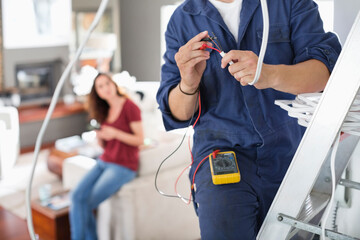A Residential Electrician is an individual who works in residence. Meriden Electrician works to solve electrical problems, install new equipment, and provide energy efficiency information. In addition, residential electricians are also responsible for testing the electrical system in a home to ensure that it is safe.

Installing electrical equipment. Installing electrical equipment for residential customers is a complex task. State and federal regulations govern the process. Before purchasing electrical equipment, customers must inquire about the type of service that is available. The company may require the customer to install the equipment per the electric codes.
Generally, electric services are provided in one of two ways: directly from the transformer or through a network. Network service is normally found in urban areas. A building must have a single main disconnecting device to receive network service. If a customer wants a back-up service during an unscheduled outage of a facility, the company may provide a backup source of electricity.
For both types of services, the company will not make a direct connection to the fuse box or the main switch. Instead, the company will designate the service voltage based on the location of the service equipment and the customer’s proposed load.
Troubleshooting electrical problems. Electrical troubleshooting is the process of identifying, diagnosing and repairing any electrical issue. It involves analyzing the behavior of the faulty electrical circuit. Usually, electrical problems in a home may be caused by a number of factors. Typically, it is a good idea to call a licensed electrician for assistance.
To troubleshoot an electrical problem, start by examining the circuit breakers in your home. If the circuit is tripped, you can try resetting it. You can also check if you have GFCI outlets.
Next, try plugging in different devices and appliances. If the lights turn off, there is a chance that the outlet or device is overloaded. Another problem could be a tripped fuse. The easiest way to fix a blown fuse is by removing the fuse from the electrical panel.
The best tool for removing a faulty fuse is a fuse puller. Once the fuse is out, it should be replaced with a new one.
Providing energy efficiency information. There are many ways to save energy and money. For instance, you can upgrade to energy efficient appliances and fixtures. Also, you can monitor your energy usage with a smart meter. Lastly, you can employ the services of a residential electrician to install a full home smart home system. This is the best way to ensure that your home is insulated and comfortable while maximizing your electricity savings.
The same goes for the most obvious, namely, upgrading your light bulbs. Changing from a conventional bulb to an energy-efficient LED bulb will save you a ton of money over time. To further improve the efficiency of your lighting, you can upgrade to a more energy-efficient lighting package from Schneider Electric.
It’s no secret that energy costs are on the rise. With the help of a residential electrician, you can save on your power bill. You can also take advantage of tax credits and rebates to lower your bills and upgrade your fixtures.
Getting a job as a residential electrician. A residential electrician is someone who repairs or installs electrical systems in a home. They may work on a new or existing home. In some cases, they’ll be on call to respond to emergencies. Most residential electricians work for local contractors, but they can also own their own businesses.
To become a residential electrician, you need to complete training. These programs are offered at vocational schools and community colleges. You’ll learn about the National Electrical Code. Then you’ll need to pass a test. This certification is usually in the form of a state license.
Depending on the state, you’ll be required to have a high school diploma and some type of electrical apprenticeship. The length of these programs varies, but most apprenticeships are four to five years.
After you’ve completed an apprenticeship program, you’ll be eligible for a residential electrician’s license. While you’re working, you’ll learn about green energy solutions and safety. As an electrician, you’ll also need to develop communication skills. This can help you explain the work you’re doing to homeowners.